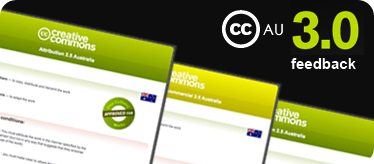I’ve been meaning to post about all the exciting things Creative Commons Australia have been up to since I returned from the fabulous Building an Australasian Commons national conference (and the linked Creating Value: Between Commerce and Commons international conference), but it’s taken a few weeks so first off I want to draw your attention to the Creative Commons Australia 3.0 draft licenses which have been ported to Australia, bringing CCau up to date with the global 3.0 releases. The licenses are in draft form and open for comment now, so I’d encourage you to take a look and leave comments if any come to mind. This version is more directly based on the CCNZ 3.0 licenses which are considerably more understandable for the layperson (ie non-lawyer, like me). The public comment phase has been going for a while, and for comments to be addressed before the official release they need to be made by 1 August 2008 (yes, I should have mentioned this earlier, but go look now, you’ve still got a couple of weeks).
Equally exciting, a global project spearheaded by Creative Commons Australia has been released: the Creative Commons Case Studies project. One of the biggest challenges when explaining Creative Commons licenses to other people was the lack of examples. Sure, we can all talk about Cory Doctorow’s exemplary book licensing, but there are so many other projects out there using CC licenses to share, publicise and allow others to build upon and remix their work. Well, the Case Studies project makes life a whole lot easier, collating a wealth of examples from across the globe when groups, bands, corporations, universities and more have used CC licenses. Each case study features an overview, how the CC license is used, and the motivations for choosing a CC license; this structure ensures that we understand what CC licenses can achieve and the various philosophies behind their use (from philanthropic to purely promotional). The best part, though, is that the Case Studies project is wiki-based, meaning anyone who wants to can add an example either of their own use, or of someone else’s exemplary work under CC. I’ve got a couple of examples of past work with my students I’ll by adding soon, and I hope if you’ve been using CC licenses either in education or anywhere else, you might want to consider documenting your best examples to share with the world, too.


